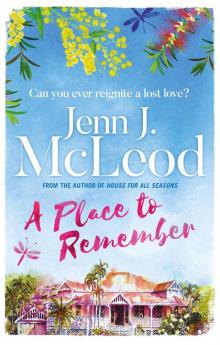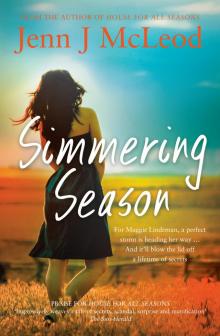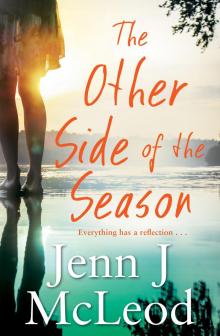- Home
- Jenn J. McLeod
Other Side of the Season Page 21
Other Side of the Season Read online
Page 21
‘Gah! Sorry–again. That was insensitive and stupid. I can’t believe I . . .’ Her embarrassment burst into a sob, turning Sid into a blubbering mess. Could the day get any worse? ‘I’m sorry. I’m clearly a tad emotional. Time to buck up, as my mother would say. Tears are for the weak.’
‘And there’s no unhappiness a hug can’t heal. Come on.’ He leaned toward her, wrapping a reassuring arm around her shoulders and pulling her body into him. When he pressed her cheek against his chest the action felt so paternal it evoked memories of her father’s comforting hugs. No longer concerned about being stoic, Sid let herself pretend David was her father and she let the tears fall.
‘Would a drink help?’ David asked after a while, drawing away to look her in the face.
‘Tea?’
‘Tea!’ He said the word as if it might magically appear. ‘Tea will help you feel better?’
Sid nodded, sniffed some more and cast a furtive glance in the dark, hoping she hadn’t left snotty nose dribbles over his track top. ‘Always, only I favour herbal to caffeine.’
‘Then herbal tea it shall be. Although not my beverage of choice when times are tough, I reckon I’ll find a special buck-me-up brew to do the job. Pearl’s forever putting homemade blends in my kitchen, no doubt hoping to wean me off other options.’
His laughter surprised the last sob from Sid. ‘A buck-me-up brew would be perfect.’ And exactly what she needed before facing her mother again tomorrow.
‘Good. Come on Pablo, boy.’
After activating the remote lock on the car–a reflex from living in the city–Sid followed close behind David, hesitating only when he turned away from the main house, instead heading towards the cottages.
That’s okay, she told herself, making sure she took several deep breaths to calm the niggle in her stomach and pray she didn’t throw up.
The day’s final humiliation!
The hug at the car had been fatherly, Sid told herself. He’s being kind by offering a distraught woman tea and that’s all.
‘Thanks,’ she said, stepping through the door David held open and feeling instantly warmed by the slow-combustion fireplace in the corner of the room. Pablo rushed ahead, jumping onto the hearth rug, pawing at it before circling twice and curling into a furry ball.
A fire! That’s why she was in his private accommodation. The main house would be freezing at night, and he wouldn’t leave a fire unattended here for too long. As far as heating was concerned, it was far more effective than the little electric heater in the cabin that she had to almost sit on top of to get warm. Yes, this was exactly what Sid needed.
‘I’ll get straight on to the tea,’ he said.
Sid hovered awkwardly just inside the front door before following him through the maze of easels scattered across the wooden floorboards. The kitchen’s circa 1970s décor, including the black and white tiled linoleum flooring and gas hot water unit on the wall above the sink, was a surprise. At least the worker’s cottage had a modern kitchen. Not that Jake was taking advantage of the nice fit-out. Cooking seemed to be the last thing on her brother’s mind these days. Cooking didn’t seem too high on David’s priority either and the well-used look of the microwave, and the contents of the small bin in the corner, suggested packaged meals for one were common.
She leaned a shoulder against the doorframe, crossed her feet at the ankles and shoved her thumbs in the belt loops on her jeans, thinking David looked lost in a kitchen, opening cupboard after cupboard–again suggesting he rarely prepared fresh food.
‘Ah-ha! Always the last place we look,’ he said, holding a small tea canister decorated with white ribbon. ‘Pearl’s brew.’
Without a paintbrush in them, his hands seemed to tremble, especially when they reached up to retrieve a teapot from the top of the cupboard. The old china pot didn’t look to have had too many wash-ups recently and Sid was questioning her decision to partake in tea when the vessel slipped from his fingers and landed on a plate on the bench. Sid jumped forward, quick enough to catch the sturdy teapot before it fell over the edge and onto the floor, but not quick enough to save the plate, now in several pieces.
‘My right hand occasionally fails me. Then again, how else does an artist find material for their mosaics?’ He tugged at the jammed top drawer swollen with age and reefed it open, grasping the edge of the countertop to stop himself losing balance in the process. His hand roamed the cluttered space, an open palm pushing cutlery back and forth with some urgency until he found two mismatched teaspoons.
Why, Sid had wanted to ask, when you own a luxury B & B, does your cutlery not match, your drawers not open, and your kitchen look like something from a seventies sitcom? From what she’d seen of the main house–the furnishings and décor–there’d been no expense spared.
‘I don’t make tea in here very often these days.’
‘I was wondering.’ She smiled.
‘I’m not used to being watched either,’ David returned. But before Sid could react–maybe take the hint and make herself busy poking around the various works in progress–he added, ‘And that’s not a hint to leave. I was feeling like some company tonight. Your timing is perfect. My coordination wanting.’
‘Then let me help.’ She made to move from her spot in the doorway but he thrust the hand clasping two teaspoons in her direction.
‘Not enough room for you, me and these.’ He indicated the two crutches: one under an arm, the other leaning against the counter, the open kitchen drawer preventing the stick from sliding to the floor.
‘Do you mind if I ask you something?’ Sid ventured.
‘Not if you don’t mind me not answering.’
‘That’s a bit odd.’
‘What is?’
‘Why would you want company if you don’t want to talk?’
He stopped what he was doing to look at her. ‘Is that your question?’
‘Yes, ahh . . . Actually, no.’
‘Which is it, then? Yes or no?’ He was smiling, playing with her, their laughter relaxing. A good sense of humour could always put Sid at ease.
‘I wanted to ask why you don’t live in the main house?’
‘Never was partial to big spaces. All I need is a bed, my equipment, and a few easels–all in close proximity. Having things within reach makes life easier.’ As if to prove his point, he made his way to the sink without the aid of crutches.
‘Of course.’
‘Less cleaning, too. Besides, that enormous house is old and cold and filled with memories I’d rather not be reminded about every day. Building a fancy B & B was my father’s idea. With him not here anymore, I’m happy to hire seasonal workers and ignore the place as best I can.’
‘And your mother is . . . ?’
‘Lost Mum a while ago,’ he said, inspecting the inside of two mugs.
Not so long ago that the loss didn’t show on his face, Sid decided.
‘I think I may have found everything we need.’ David filled the kettle with water, flicked the switch and turned to Sid. ‘Now we watch the water boil. Much like watching paint dry. I assume you paint?’
‘I used to, when I was young. My mother taught me about composition, and about light and shadow and how art should inspire and bring joy to others. She says images can be powerful and important and those involved in creating them–be it words or pictures–can use their work to make a difference, start conversations and connect people.’
‘Your mother taught you that?’ he asked.
‘Yes. She’s very clever with her hands, whereas my father liked to play with words. He was also very literal-minded. When I was at school I was convinced I’d either write a masterpiece or I’d paint one.’
‘Which did you choose?’
‘In the end I didn’t do either, becoming a graphic designer instead, which means my creative output these days is mostly computer-generated. You probably wouldn’t see that as art. And I don’t think my mother would say what I do is powerful and important.’
‘Any creative endeavour is art, even the old phone doodle.’
‘Phone doodle?’
‘John Angus Boyd was discovered after he doodled with a black pen on a pad while talking on the telephone. His girlfriend was breaking up with him at the time. He called the piece Dear John.’
‘I didn’t know that.’
‘Different artistic endeavours suit different moods, and as you’ve probably figured out by now, I have lots of moods. Acrylic for lazy days, oils when I need to refocus. And working in clay tends to be therapeutic.’
‘You mentioned mosaics, too.’
‘Hmm, yes, my mosaics,’ he said, grinning. ‘I’m forced to do them simply to use all the china I break. Now . . .’ He inspected the inside of the fridge. ‘Milk?’
Sid felt herself smiling with him. This man was a surprise a minute, his interest in her humdrum existence, and his easy banter, not at all what she’d expected.
When he took a bottle of milk from the refrigerator, removed the lid and sniffed, Sid blurted, ‘Black for me.’
‘Me too.’ He glanced her way and with another wry smile and poured the milk down the sink.
The sound of chunky liquid was testing her stomach. Sid had to turn away for a moment. ‘You mentioned acrylics and oils before, yet all I see looking around the room are watercolours. What makes them a favourite?’
He ran water and rinsed out a cloth over the sink, wringing it tight in his big fist. ‘Watercolours are delightfully deceptive.’ Inspecting his hands, he frowned, then promptly swiped them one at a time across his chest, leaving a streaky, elongated handprint on both sides of the navy blue top.
‘Surely deceptive is never a good thing?’ Sid asked.
‘Perhaps sensationally simple is better than delightfully deceptive, although a watercolour is anything but simple. They might look whimsical, like child’s play, but there’s a discipline required. A delicate balance between control and letting go.’
‘That doesn’t sound easy. Not in artistic terms, or in life.’
‘Nothing worthwhile is ever easy.’ He frowned again. ‘Would you mind passing me that stick? Thanks,’ he said, steadying himself on both crutches. ‘Perhaps I’m drawn to the unpredictability of the medium because real life–mine, at least–is as predictable as one can get.’
‘Predictability sounds rather comforting to me.’
‘Whether you’re an artist embracing the unpredictability of your medium, or just trying to understand life’s randomness, sometimes the less you try to control it, the better the result.’
‘In other words, go with the flow. Now that sounds like a great watercolourist’s mantra.’
‘I don’t want to be someone who can’t feel genuine contentment unless they have control over every aspect of their art and their lives. We never will, Sidney. We need to learn from life’s fickleness and put our trust in the materials we’re given.’
‘Better than putting your trust in people,’ Sid mumbled.
He stopped midway through pouring hot water from the kettle to look at her. ‘People will continue to surprise you, and not necessarily in good ways.’
‘You can say that again.’
‘Sidney, always remember, sometimes good people do bad things.’ Before she could respond he pointed to the small square table and two chairs in the corner and asked, ‘Are you warm? I have plenty of firewood cut, thanks to your brother, which only makes me feel worse that he ended up in hospital.’
‘Like I said, Jake and hospitals are not strangers.’ Sid carried their drinks to the table. ‘And temperature-wise I’m fine, and feeling much better. I think the constantly changing weather is mucking up my moods.’
‘This season has been good for watercolours. Not too difficult to maintain paper quality–especially outside, which is where I prefer to work.’
He seemed to come to life whenever he talked about his art and it was rubbing off on Sid. She missed the creative connection that her work at the design studio had provided. Or was it the sweet-smelling cup of tea she held under her nose that was enlivening her?
‘It’s mostly the lure of the natural light, I think,’ he went on, ‘but when conditions are just right, extraordinary things start to happen. Pigment creeps over the paper and the colours seem to come to life. Oh dear, listen to me carry on. I forget not everyone is as interested in art as me.’ He took a sip of tea and grimaced. ‘I’m a dreadful host.’
‘I don’t agree at all, although this tea is quite awful.’ They both laughed, but then he looked at her seriously again.
‘I can’t help wondering. What’s so bad that a beautiful young woman like you has such a restrained smile?’
Sid touched the fingers of one hand to her mouth, tracing her lips. ‘Thirty-five is hardly young.’
‘You’re thirty-five?’ he asked, with more surprise than Sid thought necessary. ‘I suppose I’d know that if I bothered with proper employment processes, but the rate I go through employees, too much admin would leave me no time to paint.’
‘Yup–thirty-five! And still trying to figure out my life.’ Sid fingered the table centrepiece–a mosaic dish. ‘Does being skilled at mosaics mean you’re good at taking broken things and putting them back together?’
‘I suppose it does, but a wise person will stop short of doing the same with people. I prefer working with fragments of glass and ceramic.’
As if on cue, one of his crutches slipped, his frantic hand knocking the mug of tea and slamming it against the sturdy centrepiece. The mug broke and tea flooded the table top. ‘Ah, there, you see. You can tell I’m not used to entertaining.’ He started to gather up the broken shards.
‘Let me help.’ Sid grabbed a dish towel from the sink to mop up the spilt tea, but not before it had soaked his trousers and the chair’s padding.
‘Blasted crutches!’ He brushed the one damp thigh, leaving a dark red smear in the process.
‘You’ve cut yourself!’ She saw blood oozing from a gash near his wrist. ‘You need to wash that and stem the bleeding. I’ll tidy up here.’
David left the kitchen without an argument, one foot scraping awkwardly along the floorboards, while Sid mopped up the spill, added more hot water to the pot, hoping to dilute the strong tea, and poured two fresh cups. Spying a plastic container pushed to the back of the bench, she peeked inside. ‘Tim Tams–yum!’
Sneaking a look in the top row of cupboards confirmed Sid’s earlier suspicion. The shelves looked like the pre-packaged food section of the supermarket. The bottom cupboards–which David obviously couldn’t access–were mostly empty, apart from some cleaning gear and a wooden tray pushed to the back. ‘Perfect.’
Once wiped over, the tray looked very much like one her mother had mounted on the kitchen wall when Sid was young. More a work of art, really. The natural timber of the tray featured an outback landscape: ghost gums, a calm river, a dawn sky. Her brother had once made a similar tray in woodwork class and someone had paid five dollars for it at a garage sale one year. Jake had bragged for weeks that he was the professional artist in the family. Her mother’s tray eventually found its way into the camphor chest. The glory box Natalie had insisted Sid needed in preparation for her happy-ever-after wedding was stored somewhere at her mother’s house. Sid made a mental note to dig the tray out when she got home. A tray should be used.
The sound of feet sliding over wooden floors told her David was on his way back. She loaded the tea and biscuits onto the tray and carried them into the living room, where there were comfortable and dry seats.
‘There!’ Sid presented the tray on the coffee table, proud of how perfectly tea-like everything looked, considering the jumble of cups, saucers and spoons.
David’s face froze, like it had the time he’d caught her in the main house after she’d read Rose’s letter. But rather than glaring at Sid, this time he focused on the tray.
Oh, now what?
‘I’m sorry. Is using the tray not all right? I found it and
. . . My mother had one very similar back in Sydney. I–’
‘Your mother?’ His face now had that trying-to-calculate expression.
‘Yes, that was her at the breakwall today.’ Sid noticed a tiny river of red trickling down his hand and along his forearm. ‘You’re still bleeding.’
‘It’ll stop soon enough,’ he said.
‘Well, it will stop sooner with a little pressure. At least let me make sure the wound is clean. Do you have any bandaids, a sticky plaster, something?’
‘In the bathroom. A blue box, like a shoebox.’
‘Then sit down and keep pressure here.’ She rested David’s arm, palm up, on his knee and held the first two fingers of his other hand over the cut where she’d placed a clean tissue from her pocket. ‘Press until I get back.’
‘On second thoughts it might be the red bag,’ he called after her. ‘I’ve got half a hospital in that bathroom.’
When Sid returned with a towel and a container of bandages, the bleeding had eased a little. Still, she mixed boiled water from the kettle with tap water until tepid, then added some salt from the container on the counter. Sliding a footstool over to sit on, she slipped the towel over his knee and dipped a wad of scrunched-up tissue into the mild saline solution.
David seemed preoccupied–that, or the cut was hurting more than he let on. Neither spoke as she bathed the wound, but when she glanced up at him on one occasion he was staring. Sid was still bursting to know what had happened to her boss to put him on crutches. If not a car crash, had it been a childhood accident? And why did he live here alone, in such an isolated, albeit beautiful part of the country, with only passing travellers for company? Was now the time to ask?
What the hell, Sid, ask anyway. Say, ‘What happened to you, David?’ Either he’ll answer or he’ll throw you out for being nosy.
‘Do you mind if I ask something else?’
David continued to stare at the wound Sid was cleaning. ‘You are a curious one.’
‘Jake reckons I interrogate. I don’t mean to. There’s nothing wrong with asking questions, is there?’
‘If you don’t mind the response,’ David replied. ‘I stopped asking the questions I didn’t want the answers to a long time ago.’

 A Place to Remember
A Place to Remember Simmering Season
Simmering Season Season of Shadow and Light
Season of Shadow and Light House for All Seasons
House for All Seasons Other Side of the Season
Other Side of the Season